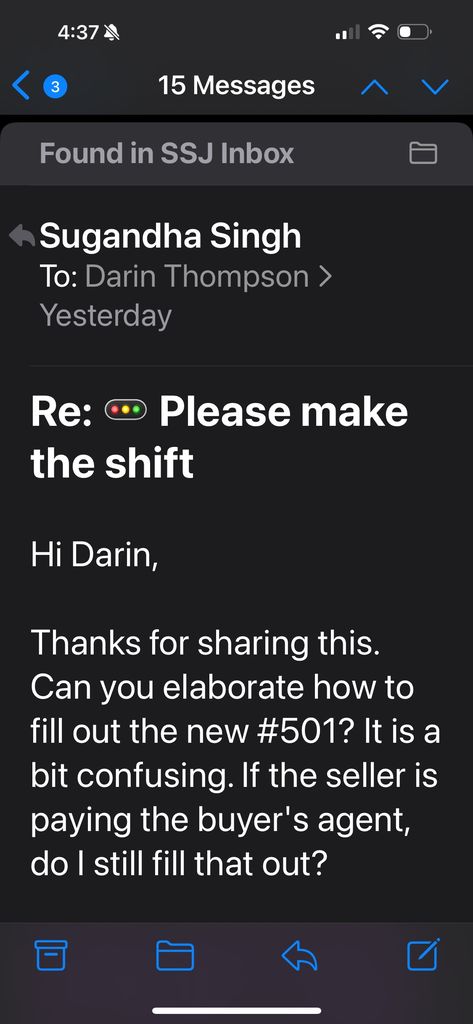Real estate agents across Massachusetts are facing a massive shift in how buyer representation works. Are you ready to navigate the changes, or will you be left behind?
The National Association of Realtors (NAR) settlement has fundamentally altered real estate forms, requiring agents to rethink how they structure offers, explain commissions, and protect their earnings. The Massachusetts Association of Realtors (MAR) has rolled out new forms—including the Exclusive Buyer Agency Agreement (#714) and the Contract to Purchase Real Estate (#501)—that are more interconnected than ever. Mastering these forms isn’t optional; it’s essential if you want to maintain credibility, ensure compliance, and, most importantly, get paid.
Let a Massachusetts real estate agent mentor and coach give you a clear understanding of the updated forms, how to use them strategically, and how to avoid common pitfalls that could cost you money.
Video 1: Understanding the Latest Real Estate Forms
👉See the provocative position piece on the NAR settlement
YouTube Shorts video 1 of 5 sets the stage, given the unprecedented change in the real estate industry stemming from the NAR lawsuit, understandably, there’s so much ambiguity for real estate agents right now, especially for buyer’s agents.
There are really two big changes to work through in MAR forms, not Greater Boston Real Estate Board (GBREB) forms. You must become fluent in how all these new contracts fit together because the level of interconnectedness among all the forms is at a whole new level for real estate agents – read the forms!
Video 2: Start Using New Exclusive Buyer Agency Agreement
YouTube Shorts video 2 of 5, urges agents to use the latest MAR forms, while the decades-old GBREB forms are certainly more straightforward and “basic”, they don’t have the updated buyer’s agent commission language present in the MAR forms.
The first big change is the Exclusive Buyer Agency Agreement (#714) (NEW), while still not legally required, you’d be foolish not to use it as it sets you up for getting paid as a buyer’s agent in the new normal. Read the entire form, double click on section 4 Broker’s Compensation. Massachusetts agents must walk buyers through this document and confidently speak to how much they charge for their services, and clearly illuminate the fact that section 4 c ii outlines to the buyer clearly that buyer’s agents will first seek compensation from the listing agent or seller.
Video 3: Bridge Buyers to New Offer Contract
YouTube Shorts video 3 of 5 mentors bridges from the new Exclusive Buyer Agency Agreement over to an Offer buyer’s agents will write with and for their clients. All the latest MAR forms are interconnected in ways we’ve never seen before. In the previous video, we looked at the new buyer rep agreement which references the newly promulgated Contract To Purchase Real Estate (Offer) (#501) (NEW) – if buyer’s agents are going to do this right, using the new MAR forms is a must!
It’s in section 2 Compensation to Buyer Broker in the new 501 where buyer’s agents bridge, just like you told your client you would, from the buyer rep agreement section 4 c ii over to the Offer, in requesting compensation first from the listing agent and/or seller. You see how these forms seamlessly work together – we’re illuminating the bridges between the forms, but you must read the forms and establish fluency for yourself.
Bonus Video 4: All Agents Now Use Buyer Agency Agreement
YouTube Shorts video bonus 4 of 5 in this buyer’s agent mini-series where we coach MA agents through the early stages of a buy-side transaction.
Here’s a question from an agent in Massachusetts: Can you elaborate how to fill out the new #501? It is a bit confusing. If the seller is paying the buyer’s agent, do I still fill that out?

Massachusetts real estate agent questions buyer agency compensation details in new MAR forms
This question is really about the new Exclusive Buyer Agency Agreement (#714) (NEW). As discussed, the buyer agency agreement is not legally required, but let’s ask a question, “At the moment when you’re contemplating filling the 714 out or not, will you know if the seller of the home that will eventually be purchased will offer buyer’s agent commission?” No, a buyer’s agent will have little to no idea. So if you want to get paid as a buyer’s agent, you must fill out an Exclusive Buyer Agency Agreement.
Historically, it was the exception to jump through the extra hoops of having a buyer fill out and sign a buyer rep agreement, yet it should now be the standard – all Stuart St James agents are encouraged to use the new form and make it a standard part of the process of working with buyers in the new normal.
Don’t miss the next bonus, a simple suggestion will demystify a massive point of confusion for Massachusetts real estate agents.
Bonus Video 5: Avoid Buyer’s Agent Compensation Trap
YouTube Shorts video bonus 5 of 5, providing value as we mentor and coach MA real estate agents through the early stages of writing an offer in the post-NAR settlement world with all new forms from MAR.
There’s a common mistake agents are making with the new Buyer Agency Agreement, not legally required but highly recommended. Did you read the form? If so, did you notice the trap in section 4 d?
Consider this, as a buyer’s agent, you just told your buyer how much you charge for your services. You’ve told them that you’re going to first seek compensation from the listing agent and/or seller. Section 4 d says “The BROKER is prohibited from receiving compensation for brokerage services from any source that exceeds the amount or rate agreed to in this Agreement“.
⚠️ This sentence in Section 4 d could prevent you from collecting compensation beyond what’s agreed upon. For instance, if you negotiate a $5,000 flat fee with your client, but the seller is offering $10,000, you won’t be able to collect the full $10,000 because of this clause.
This could be seen as a reason to not use the 714, but we discussed why you should and the pros outweigh the cons.
Understandably, buyer’s agents want to avoid the compensation trap created by the Exclusive Buyer Agency Agreement, so what’s the solution? The productive and quick solution to this dilemma: assuming we’re all working in good faith, with your client’s permission, strike just the prohibited clause from the agreement (not the entire section 4 d), and make sure you and your client initial that change.
Ultimate Guide to Massachusetts Real Estate Forms: Secrets Only the Pros Know
Navigating these new MAR forms requires more than just familiarity—it demands fluency and foresight. As real estate agents, understanding how the Buyer Agency Agreement and Contract to Purchase work together will help you add real value to your clients and ensure you’re always compensated for your efforts. Stay tuned for more tips, and don’t hesitate to dive deep into these forms to master them. If you got value from this, consider our real estate agent coach and mentor programs to level up your excellence and make real estate a lifelong career.
By offering value to your clients and being prepared with these insights, you position yourself as an expert they can trust—while also securing your own success.

